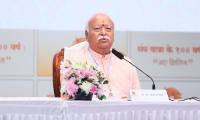India's first mission to moon -- Chandrayan-I -- is tentatively scheduled to be launched on September 19 this year, Indian Space Research Organisation Chairman Madhavan Nair told newsmen in Hyderabad on Friday.
He said that all the preparations have been nearly completed and the exact date of the launch will be decided within a month. He described September 19 as the 'earliest opportunity' for the historic launch.
He was speaking on 'Indian Space Programme - Future Perspectives', during the National Technology Day lecture in Hyderabad, organised by the Andhra Pradesh Academy of Science and National Geophysical Research Institute.
The final stage of integration of instruments with the spacecraft was going on and test and evaluation was also in progress. "The mission to moon, apart from other things, will help to map the moon," Nair said.
Nair was confident that Chandrayan I will expand the scientific knowledge about the moon and also upgrade the technological capability of India.
"Crores of years ago, a crumb from our planet spun off. Now, in a few months, we would be landing there to get back in touch with it again," he said.
"In the next four years, India will be among the most developed nations in space research and development," he said, pointing out that the launch of ten satellites simultaneously two months ago was a demonstration of this capability.
Talking about the future programmes of ISRO, Nair said five major satellites would be launched from the Satish Dhawan Space Research Center at Sriharikota island of Andhra Pradesh. They include Megha Tropiques, a Indo-French joint mission to study water cycle in tropics, Risat, a radar imaging satellite, 'Astrosat', a multi wavelength astronomy satellite and 'Satellite Navigation IRNSS'.
He said the ISRO was also planning to send a mission to Mars in the future.
Pointing out that the ISRO has received two contracts for launching commercial satellites in the next two years, he said that Antrix Corporation, the commercial wing of the ISRO, was now doing a business of Rs 1000 crore.








